英国文学18-19世纪浪漫主义
英国文学:浪漫主义时期(romanticsm)

英国文学:浪漫主义时期(romanticsm)18世纪末和19世纪出浪漫主义文学在全欧盛行。
浪漫主义作家反映了那一时期处在资产阶级革命和社会革命时期的社会情绪、意识形态及人生观。
他们注重人的本能和感情,以此表达对社会现实的不满。
浪漫主义文学与古典主义的灵感的想像,思想与情感,尤其主张以诗歌来抒发个人的情感,表达对理想的追求。
英国诗人威廉.布莱克和罗伯特.彭斯开创了浪漫主义诗歌的先河,到了19世纪上半叶,英国的浪漫主义诗歌达到顶峰。
由于诗人的社会立场和作品的思想内涵不尽相同,19世纪前期英国浪漫主义可分为消极和积极两个派别。
以威廉.华兹华斯、柯尔律治、骚塞等“湖畔诗人”为代表的消极浪漫主义诗人愤世嫉俗,忧郁失望,作品以诗吟湖光山色和田园风光为主。
以拜伦、雪莱、济慈等为代表的积极浪漫主义诗人则充满破除封建束缚的革命激情和向往新生活的崇高理想。
作品强调自由平等和个性解放,充满瑰丽的想像和奔放的激情。
威廉.布莱克的《天真之歌》展现了一个充满博爱、仁慈、怜悯和快乐的世界。
诗人用孩子般的眼光看世界,用空想欢乐主义来理解社会。
鲜明有力的诗句中处处渗透出诗人对生活与自然的孩子般率真而欣悦的感受以及对宇宙和谐的领悟。
在《经验之歌》创作与刻印期间,诗人的思想受到法国革命的巨大冲击,对革命寄予了深切的同情。
诗人清楚地理解了英国人民的苦难,不再天真,对社会有了深刻的经验。
布莱克的其他作品与以上诗集风格有所不同。
形式上,他放弃了惯用的格律而采用无韵的自由体诗,内容上,他以歌颂人性解放与精神自由、歌颂革命、反对传统的理性主义以及英国封建专制以及追求崇高而神圣的理想为主。
《耶路撒冷》一诗长四千多行,主要讲了人的堕落与重生。
布莱克诗中的人道主义与民主主义精神赋予了诗歌极大的生命力;艺术上打破了18世纪古典主义的清规戒律。
他强调本能、感情、想像力,以清新奔放的无韵体诗抒发理想。
布莱克给诗坛带来的一股清新奇特的诗风对后浪漫主义的发展有着功不可没的贡献,是浪漫主义诗歌的先驱。
《英国浪漫主义文学》课件

历史背景
哲学思考
英国浪漫主义文学作品中常常包含深 刻的哲学思考,探讨人性、道德、自 由等主题,表现出对人类命运的关注 和思考。
英国浪漫主义文学关注历史背景,将 文学作品与历史事件、社会现实等联 系起来,展现出浓厚的历史感。
05
英国浪漫主义文学的影响与评价
对世界文学的影响
01
丰富了世界文学的多样性
作品风格
现实主义与浪漫主义相结合, 注重细节描写和人物塑造
晚期浪漫主义
时间范围
1830年-1860年
特点
关注人性探索,深入挖掘内心世界,强调个 性表达
代表人物
丁尼生、布朗宁、梅尔维尔等
作品风格
心理分析、象征主义和神秘主义,注重艺术 表现和情感渲染
03
英国浪漫主义文学的主要代表人 物及其作品
威廉·布莱克
诗歌形式与技巧
诗歌形式
英国浪漫主义诗歌形式多样,包 括长诗、短诗、叙事诗等,强调 韵律和节奏感。
象征与隐喻
英国浪漫主义诗歌善于运用象征 和隐喻手法,通过具象的描绘传 达抽象的概念和情感。
情感渲染
英国浪漫主义诗歌注重情感渲染 ,通过强烈的情感表达和渲染来 打动读者。
自然与人文的融合
பைடு நூலகம்
自然描绘
英国浪漫主义作家善于描绘自然,将 自然元素融入到作品中,强调人与自 然的和谐共存。
01
时间范围
1789年-1800年
02
03
04
代表人物
拜伦、雪莱、济慈、华兹华斯 等
特点
强调个人情感、自然和自由, 反对理性主义和传统束缚
作品风格
富有想象力,追求形式和语言 的创新
中期浪漫主义
时间范围
英国文学发展概述(3)

英国文学发展概述(3)五、浪漫主义时期文学(1798-1832)18世纪末、19世纪初,英国诗风大变。
苏格兰农民诗人罗伯特·彭斯(Robert Burns, 1759-1796)给英国诗坛带来一股新鲜的气息。
他的抒情诗自然生动,感情真挚,讽刺诗尖锐锋利,妙趣横生。
威廉·布莱克(William Blake, 1757-1827)是版画家兼诗人,想象奇特,极富个性。
他的短诗意象鲜明,语言清新,后期的长诗内容比较晦涩。
他在诗歌中建立起自己一套独特的神话体系,具有神秘主义色彩。
布莱克的革命性、独创性和复杂性使他成为浪漫主义诗歌的先驱。
1798年,威廉·华兹华斯(William Wordsworth, 1770-1850)与塞缪尔·泰勒·柯勒律治(Samuel Taylor Coleridge, 1772-1834)合作出版了一本小诗集《抒情歌谣集》(Lyrical Ballads ),其中大部分诗歌出自华兹华斯之手,用简朴的语言描写简朴的生活。
《抒情歌谣集》的问世标志着英国浪漫主义文学的真正崛起。
华兹华斯在1802年诗集再版时写的序中对诗歌作出了著名定义:“好诗是强烈感情的自然流溢”。
浪漫主义是对新古典主义的反拨:诗歌内容不再是对现实的反映或道德说教,而是诗人内心涌出的真实感情;诗歌语言不是模仿经典作家去追求高雅精致,而是要贴近普通人的日常用语。
浪漫主义诗人崇尚自然,主张返朴归真。
浪漫主义是一个比较笼统的概念,每个诗人各有其特征。
同样是“湖畔派”诗人,华兹华斯将大自然视为灵感的源泉,自然美景能给人力量和愉悦,具有疗效作用,使人的心灵净化和升华,柯勒律治则赋予自然神奇色彩,擅长描绘瑰丽的超自然幻景。
乔治·戈登·拜伦(George Gordon Byron, 1788-1824)和波西·比希·雪莱(Percy Bysshe Shelley, 1792-1822)属于革命诗人,但拜伦自我表现意识强烈,而雪莱深受柏拉图哲学影响,憧憬美丽的理想和理念。
英国文学的发展及其代表作品
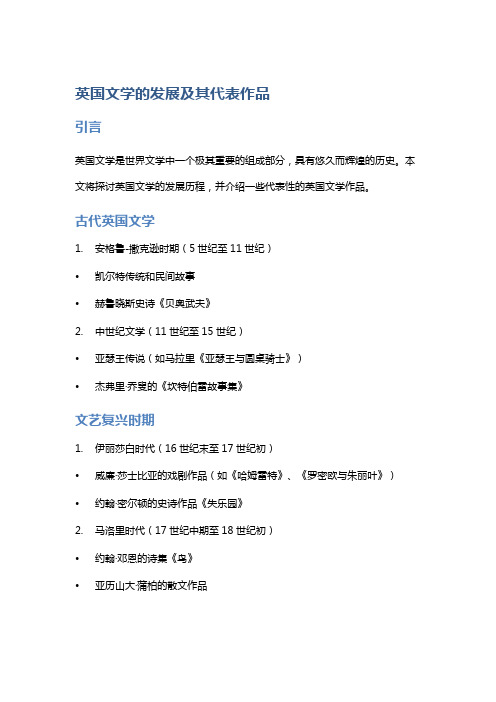
英国文学的发展及其代表作品引言英国文学是世界文学中一个极其重要的组成部分,具有悠久而辉煌的历史。
本文将探讨英国文学的发展历程,并介绍一些代表性的英国文学作品。
古代英国文学1.安格鲁-撒克逊时期(5世纪至11世纪)•凯尔特传统和民间故事•赫鲁晓斯史诗《贝奥武夫》2.中世纪文学(11世纪至15世纪)•亚瑟王传说(如马拉里《亚瑟王与圆桌骑士》)•杰弗里·乔叟的《坎特伯雷故事集》文艺复兴时期1.伊丽莎白时代(16世纪末至17世纪初)•威廉·莎士比亚的戏剧作品(如《哈姆雷特》、《罗密欧与朱丽叶》)•约翰·密尔顿的史诗作品《失乐园》2.马洛里时代(17世纪中期至18世纪初)•约翰·邓恩的诗集《鸟》•亚历山大·蒲柏的散文作品浪漫主义和维多利亚时代1.浪漫主义(18世纪末至19世纪初)•威廉·华兹华斯和塞缪尔·泰勒·柯勒律治的诗歌作品•简·奥斯汀的小说《傲慢与偏见》2.维多利亚时代(19世纪中期至20世纪初)•查尔斯·狄更斯的小说作品(如《雾都孤儿》、《双城记》)•奥斯卡·王尔德的戏剧作品(如《道林·格雷的画像》)现代英国文学1.20世纪早期•维吉尼亚·伍尔夫的小说《到灯塔去》•T.S.艾略特的诗歌集《荒原》2.当代文学•伊恩·麦克尤恩的小说作品(如《失落之城》、《英国病人》)•玛格丽特·阿特伍德的小说作品(如《使女的故事》)结论英国文学在各个时期都有着令人惊叹的成就,塑造了世界文学的重要角色。
从古代传统到现代创新,英国文学将继续为我们带来无尽的享受和启发。
注:以上只是一些代表性的英国文学作品,因篇幅限制未能详尽涵盖全部作品。
英国浪漫主义文学的积极贡献

英国浪漫主义文学的积极贡献【最新版】目录1.英国浪漫主义文学的概述2.英国浪漫主义文学的代表人物及作品3.英国浪漫主义文学对社会的积极贡献4.英国浪漫主义文学对后世的影响正文英国浪漫主义文学的概述英国浪漫主义文学是 19 世纪初期在英国兴起的一种文学运动。
它是对 18 世纪启蒙运动的理性主义和古典主义的反动,主张回归自然、强调个人情感和独立精神。
英国浪漫主义文学受到了法国大革命和工业革命的影响,它反映了当时社会政治和经济变革带来的思想和文化冲击。
英国浪漫主义文学的代表人物及作品英国浪漫主义文学的代表人物有华兹华斯、萨缪尔·泰勒·柯勒律治、威廉· Wordsworth、拜伦、雪莱、约翰·济慈等。
他们的作品体现了浪漫主义的特点,如对大自然的热爱、对个人情感的抒发、对历史和神话的借鉴等。
其中,华兹华斯的《湖畔诗篇》、柯勒律治的《古舟子咏》和《忽必烈汗》、拜伦的《恰尔德·哈洛尔德游记》和《唐璜》、雪莱的《解放了的普罗米修斯》和《西风颂》、济慈的《奥西曼迪亚》等作品是英国浪漫主义文学的经典之作。
英国浪漫主义文学对社会的积极贡献英国浪漫主义文学对社会的积极贡献主要体现在以下几个方面:1.倡导个人独立精神。
英国浪漫主义文学强调个人的独立性和自主性,呼吁人们摆脱社会的束缚和偏见,勇敢地追求自己的理想和信仰。
这种个人独立精神对当时的社会产生了很大的影响,它为后来的个人解放和民主运动奠定了思想基础。
2.呼吁回归自然。
英国浪漫主义文学对工业革命带来的环境和社会问题进行了深刻的反思,主张回归自然、尊重自然。
这种思想对后来的环保运动产生了积极的影响。
3.丰富文学表现形式。
英国浪漫主义文学在表现手法上具有很大的创新性,它打破了古典主义的束缚,开创了新的文学形式和风格,如诗歌、小说、戏剧等。
这种创新为后来的文学发展提供了更多的可能性。
4.倡导国际主义。
英国浪漫主义文学强调国际主义精神,主张各国人民相互理解和平等合作,共同维护世界和平和正义。
19世纪浪漫主义文学

19世纪浪漫主义文学(产生于18世纪末,19世纪上半叶为繁荣时期)
英国(是最早出现浪漫主义文学的国家之一。
英国浪漫主义作家不满于资本主义的发展,具有愤世嫉俗和向往大自然的倾向)
德国(浪漫主义文学思潮的发源地。
德国早期浪漫主义文学具有浓厚的唯心主义思想和宗教色彩。
德国后期浪漫主
法国(法国资产阶级和封建势力复辟的曲折斗争,决定了法国浪漫主义具有更为鲜明的政治色彩。
浪漫主义运动在
俄国(俄国的浪漫主义文学以诗歌为主,富有强烈的战斗精神,向往自由和民主。
由于艺术上的成功,为俄国文学的繁荣打下了基础。
)
东欧的波兰和匈牙利(以反对异族奴役、争取民族独立为主题的浪漫主义文学)
美国(争取和歌颂个性的自由和精神解放。
美国浪漫主义文学深受西欧浪漫主义文学的影响。
)。
英国文学中最早出现的浪漫主义作家是所谓湖畔派三诗人包括谁

湖畔派三诗人指的是19世纪英国的华兹华斯,柯勒律治,骚赛这三位浪漫主义诗人。
他们居住在英国北部昆布兰湖区,先后在格拉斯米尔和文德梅尔这两个湖畔居住,他们写的诗赞美湖光山色,所以被称为“湖畔派诗人”。
华兹华斯出生于1770年,他的原生家庭是一个律师之家,但是在他8岁的时候母亲去世了,13岁父亲也离开了他,1787年进剑桥大学。
1975年和妹妹多萝西移居乡间,1797年和诗人柯勒律治认识,两人一起出版了《抒情歌瑶集》。
《抒情歌瑶集》的创作是一种崭新的风格,开创了英国文学史上浪漫主义诗歌的新时代。
骚赛出生于1774年,出生于布里斯托的一个布商家庭,是“湖畔派”三诗人中人气最差的一位。
他是诗歌方面的大理论家,主要论著只是《抒情歌谣集》第二版的序言。
柯勒律治出生于1772年,是英国的诗人,文评家,英国浪漫主义文学的奠基人之一。
湖畔派的艺术主集中体现在华兹华斯和柯尔律治共同
创作的《抒情歌诗瑶集》再版《序言》还有《诗的措辞》中,他们的作品寄情于湖畔山水,歌颂大自然,用来表示对现实社会的不满和憎恶。
19世纪英国文学思潮
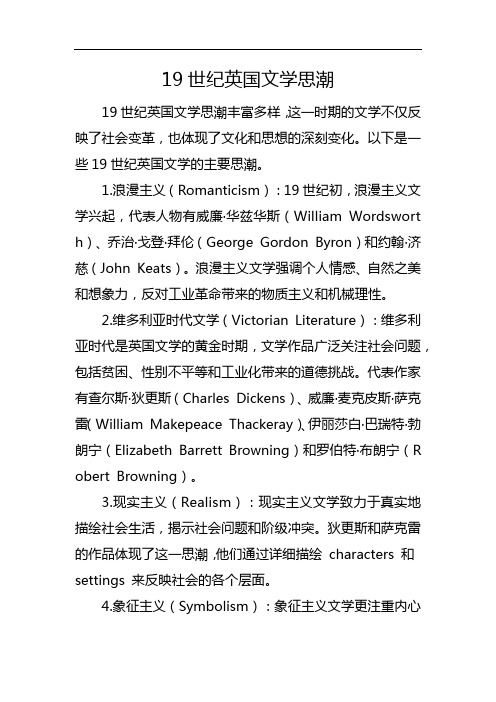
19世纪英国文学思潮19世纪英国文学思潮丰富多样,这一时期的文学不仅反映了社会变革,也体现了文化和思想的深刻变化。
以下是一些19世纪英国文学的主要思潮。
1.浪漫主义(Romanticism):19世纪初,浪漫主义文学兴起,代表人物有威廉·华兹华斯(William Wordswort h)、乔治·戈登·拜伦(George Gordon Byron)和约翰·济慈(John Keats)。
浪漫主义文学强调个人情感、自然之美和想象力,反对工业革命带来的物质主义和机械理性。
2.维多利亚时代文学(Victorian Literature):维多利亚时代是英国文学的黄金时期,文学作品广泛关注社会问题,包括贫困、性别不平等和工业化带来的道德挑战。
代表作家有查尔斯·狄更斯(Charles Dickens)、威廉·麦克皮斯·萨克雷(William Makepeace Thackeray)、伊丽莎白·巴瑞特·勃朗宁(Elizabeth Barrett Browning)和罗伯特·布朗宁(R obert Browning)。
3.现实主义(Realism):现实主义文学致力于真实地描绘社会生活,揭示社会问题和阶级冲突。
狄更斯和萨克雷的作品体现了这一思潮,他们通过详细描绘characters 和settings 来反映社会的各个层面。
4.象征主义(Symbolism):象征主义文学更注重内心世界和隐喻,通过象征和隐喻来表达情感和思想。
阿尔弗雷德·普鲁斯特(Alfred, Lord Tennyson)和约翰·艾弗雷特·米莱(John Everett Millais)等作家和艺术家在这一领域有显著贡献。
5.自然主义(Naturalism):自然主义文学试图通过科学的方式理解人类行为,强调环境因素对人的影响。
《浪漫主义诗歌对英国社会的影响与艺术实践》

浪漫主义诗歌对英国社会的影响与艺术实践1. 简介浪漫主义诗歌是英国文学史上重要的一个时期,它在18世纪末19世纪初兴起,并对英国社会产生了深远的影响。
本文将探讨浪漫主义诗歌对英国社会的影响以及其独特的艺术实践。
2. 浪漫主义诗歌的背景在工业革命和科学进步等现代化进程中,人们开始感到现实主义文学所强调的理性、功利和客观性不再能满足他们内心深处渴望自由、个性和情感表达的需求。
这促使浪漫主义诗歌在英国发展起来。
3. 社会影响3.1 表达个人情感与自由精神浪漫主义诗人通过自然描写、个人体验以及对自由,爱情和幻想等主题的追求,为现代个体提供了情感上的寄托和价值认同。
这种关注个人体验与情感表达的倾向也引发了社会上一种更加注重个性和情感的潮流。
3.2 反对社会不公与现实束缚浪漫主义诗歌揭示了社会不公和人类自由受限的问题。
艺术家们通过抒发对现实束缚的不满和追求自由的愿望,间接呼唤并有助于改善社会状况。
3.3 建立了新的审美标准浪漫主义诗歌以其独特的审美情趣挑战了传统文艺规范和创作手法。
它倡导心灵与自然的交融、超越理性束缚,为当时的文学界树立了崇高的艺术追求,影响着后来许多文学流派和艺术样式。
4. 艺术实践4.1 自然主题与描写浪漫主义诗歌着重描绘大自然,视其为灵感源泉,并通过丰富多样的描写方式表达出作者对自然界深厚而复杂的情感体验。
4.2 强调想象力与幻想浪漫主义诗人对幻想世界充满向往,他们通过诗歌表达出富有想象力的情景和让人陶醉的美丽场景,给读者带来精神享受。
4.3 唤醒读者共鸣浪漫主义诗歌强调以真实而深邃的感受力去体验生活,通过对情感与体验的表达唤醒读者共鸣,使其与诗歌产生情感交流。
5. 结论浪漫主义诗歌对英国社会产生了深远的影响。
它不仅独特地呈现了个体对自然、爱情和自由等主题的一种追求,更为当时社会带来了新的审美观念和思考方式。
这些影响延续至今,使得浪漫主义诗歌在英国文学史上具有重要地位。
英国文学史(浪漫主义时期)

英国文学史(浪漫主义时期)浪漫主义时期,其实从18世纪中叶已经开始了,罗伯特·彭斯和威廉·布莱克,开了个先河,到19世纪,华兹华斯拉开序幕,再到司各特去世,浪漫主义时代结束,其中鼎盛时期不过30多年,这一时期要讲的主要是六个诗人湖畔派诗人那三个较为消极的还有拜伦雪莱那一伙积极的,再加上浪漫主义时期的小说简·奥斯丁,还有一个司各特。
多的可能会补充。
这块先看看背景,再说一下,浪漫主义为什么会在英国兴起。
一、历史背景政治上来讲,当时英国的情况,应该是工业革命,资本主义迅速发展,成为世界工厂。
文化上面,当时法国大革命,启蒙思想已经到了高潮,人民追求自由、平等之思想已经到了极致,可是呢,法国大革命一结束,启蒙思想家所谓革命之后的理想社会,并没有出现,这个时候,整个社会,都弥漫着一股失望的情绪,对于原来古典主义所谓追求理性的观点,产生了排斥,不少作家开始,追求自我精神世界,强调自由、自然、自我,注重主观精神世界的表现。
这个时候,经过感伤主义和前浪漫主义时期的铺垫,浪漫主义时期来临,诗歌上面得到极大发展,当然流行的都是抒情诗(lyrics),最先开始就是以华兹华斯为代表的湖畔派诗人(Lake poets),这一派因为隐居于英国西北部的湖区得名,又应诗歌题材大多写田园生活,远离尘世,显得十分消极,华兹华斯和柯勒律治合编的《抒情歌谣集》(The lyrical ballads)下面先来讲一下,华兹华斯。
二、代表人物诗歌:1、挚爱自然的华兹华斯(William Wordsworth)华兹华斯出生于一个律师家庭,读书的时候,除了学习拉丁语和古典文学就是流连于山水之间,培养对自然的爱好,后来他去了剑桥大学读书,期间,研究斯宾塞,乔叟等人的文学,随后,徒步旅行到法国,被法国革命提出的“自由”、“平等”的口号所吸引,在那里住了一年多,随后“九月大屠杀”和雅各宾派的恐怖统治,大大地浇灭了他对于革命地热情,在朋友的帮助下,在湖区的乡舍中住了两年,这个时期基本热心于创作,期间还认识了柯勒律治,两个人经常相互切磋诗艺,1798年,就联手出版了《抒情歌谣集》,开一代诗风,诗集没出版的时候,华兹华斯就在致力于写作他自己的《序曲》(The Prelude ),后面就是在他离世之前,分别迁过两次,都在湖区住了七八年。
英国浪漫主义文学作品

英国浪漫主义文学作品摘要:一、英国浪漫主义文学的背景二、英国浪漫主义诗歌的特点三、英国浪漫主义小说的特点四、代表作家和作品介绍五、英国浪漫主义文学的影响正文:一、英国浪漫主义文学的背景英国浪漫主义文学起源于18世纪末,持续到19世纪30年代。
这一文学运动是对启蒙运动的反动,强调情感、自然、个性和想象力。
背景包括法国大革命、拿破仑战争以及英国工业革命等社会政治和经济变革。
二、英国浪漫主义诗歌的特点1.情感丰富:英国浪漫主义诗歌spontaneous(自发)地表达内心强烈的情感,追求真实的感受。
2.想象力丰富:创造一个充满想象的世界,远离现实主义的束缚。
3.回归自然:诗人从自然中汲取创作素材,歌颂大自然的美好。
4.同情弱者:关心社会底层,赞美平凡生活中的美好。
5.表达个性:强调个人天才,突出个性化的创作风格。
三、英国浪漫主义小说的特点1.情感真挚:浪漫主义小说充满激情,关注人物内心世界。
2.想象丰富:创造独特的虚构世界,展现丰富的想象力。
3.自然主义:小说中的人物和场景紧密联系自然,体现人与自然的和谐。
4.关注社会:揭示社会不公,关注普通人的生活和命运。
5.人物塑造:塑造鲜明的人物形象,突出个性特点。
四、代表作家和作品介绍1.威廉·华兹华斯:《抒情歌谣集》、《序曲》2.萨缪尔·泰勒·柯勒律治:《古舟子咏》、《Kubla Khan 》3.乔治·戈登·拜伦:《唐璜》、《恰尔德·哈洛德游记》4.约翰·基茨:《夜莺颂》、《希腊古瓮颂》5.简·奥斯汀:《傲慢与偏见》、《理智与情感》6.沃尔特·司各特:《艾凡赫》、《罗布·罗伊》五、英国浪漫主义文学的影响1.影响了后世文学创作,为现实主义文学奠定基础。
2.推动了文学形式的创新,如叙事诗、小说等。
3.传播了民主、自由的思想,对社会产生深远影响。
4.丰富了人类文化宝库,提供了珍贵的文学遗产。
简述英国浪漫主义诗歌的发展历程

简述英国浪漫主义诗歌的发展历程18世纪末19世纪初,英国浪漫主义文学得到很大发展。
在19世纪前30年,英国的浪漫主义文学是欧洲成就最高的文学,对欧洲其他国家的文学产生了很大影响。
英国浪漫主义诗歌的发展历程具体表现为:(1)英国浪漫主义先驱——彭斯和布莱克彭斯从苏格兰民歌中吸取养料,长于抒情和讽刺。
其代表作《苏格兰方言诗集》,揭露贵族的贪婪,赞美农民的纯朴,风格清新刚健,语言通俗,达到了18世纪英国诗歌的高峰。
布莱克运用清新的民歌体和奔放的无韵体写诗,具有象征意义和神秘色彩。
其代表作是《四天神》。
(2)英国第一代浪漫主义诗人——“湖畔派”诗人群“湖畔派”三诗人是华兹华斯、柯勒律治和骚塞。
他们对资本主义文明及人与人之间的现金交易关系极为反感。
他们的诗作或讴歌宗法式的农村生活和自然风景,或描写奇异神秘的故事和异国风光。
他们常常是通过缅怀中古时代的“纯朴”来否定丑恶的城市文明。
华兹华斯的《抒情歌谣集》序言是英国浪漫主义的宣言,华兹华斯提出诗是“强烈感情的自然流露”。
他特别强调诗人在“选择普通生活里的事件和情境”时,要给它们以想象力的色泽,使得平常的东西能以不寻常的方式出现于心灵之前”。
华兹华斯强调写“微贱的田园生活”,主张用民间的纯朴语言写诗人的真实感受。
华兹华斯关于诗歌改革的主张以及他的创作实践结束了英国古典主义诗学的统治,有力地推动了英国诗歌的革新和浪漫主义运动的发展。
(3)英国第二代浪漫主义诗人——拜伦、雪莱和济慈这三位诗人与“湖畔派”诗人不同,他们始终忠于法国革命理想,反对专*制暴*政,同情人民苦难,支持各国人民的民族解放运动,具有鲜明的资产阶级民主主义倾向。
拜伦在“东方叙事诗”中塑造了一系列“拜伦式英雄”,其《唐·璜》更因其思想艺术上的突出成就而成为世界不朽的名著。
雪莱的诗剧《解放了的普罗米修斯》气势磅礴,富有感染力。
其《西风颂》、《致云雀》等抒情诗歌,音韵铿锵,感情真挚,闪耀着深邃思想的光辉。
英国浪漫主义文学,

英国浪漫主义文学英国是最早出现浪漫主义文学的国家之一。
英国的浪漫主义文学代表了19世纪欧洲浪漫主义文学的最高成就。
英国浪漫主义内部思想精神复杂,有柯勒律治的浪漫的超自然主义、华兹华斯的英国国教的正统主义、雪莱的无神论的精神主义、拜伦的革命的自由主义、司各特的对以往时代的缅怀,等等。
但英国的浪漫主义还是有着鲜明的英国气质,即“自然主义”。
1发展崛起1789年的法国大革命(French Revolution),给对人类的未来带来了希望,并对英国社会造成冲击(Feudalism vs Capitalism)。
在这个背景下,英国的浪漫主义文学崛起,它产生于18世纪末,19世纪上半叶为繁荣时期。
先驱浪漫主义文学的先驱是18世纪中后期的诗人罗伯特?彭斯(Robert Burns)和威廉?布莱克(William Blake)。
彭斯从苏格兰民歌中吸取养料,其《苏格兰方言诗集》(《Poems,chiefly in Scottish dialect》)擅长抒情和讽刺,语言通俗;布莱克的《天真之歌》(《Songs of Innocence》)、《经验之歌》(《Songs of Experience》)则憧憬理想的社会秩序,清新奔放,富有独创性。
流派然而,浪漫主义思潮中就形成两种对立的流派,即积极浪漫主义(Active Romanticism)和消极浪漫主义(Passive Romanticism)。
积极浪漫主义是进步的潮流,敢于正视现实,批判社会的黑暗,它引导人们向前看;消极浪漫主义持温和态度,采取消极逃避的态度,反对现状,留恋过去,它引导人们往后看。
2特点英国诗人全都是大自然的观察者、爱好者和崇拜者。
表现在文学中有以下几方面体现:首先是对乡村和大海的热爱。
其次是对高级动物的喜爱和对一般动物世界的熟悉。
第三是明显的个人独立性,作家们都很有点个人癖性。
第四是讲求实际的道德观和人生观,与追求正义的强烈意愿。
英国浪漫主义在发展过程中的各阶段又有着各自的一些特点:第一代浪漫主义作家不满于资本主义的发展,具有愤世嫉俗和向往大自然的倾向;第二代浪漫主义作家坚持启蒙思想,表现出争取自由和民主的进步思想。
对英国文学史上的浪漫主义时期分析
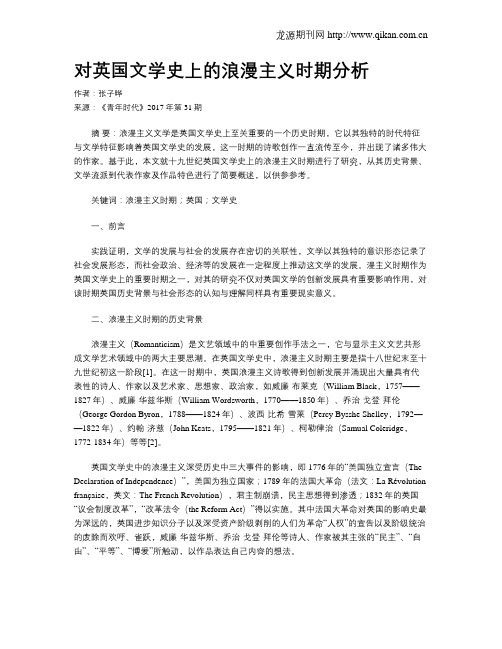
对英国文学史上的浪漫主义时期分析作者:张子晔来源:《青年时代》2017年第31期摘要:浪漫主义文学是英国文学史上至关重要的一个历史时期,它以其独特的时代特征与文学特征影响着英国文学史的发展,这一时期的诗歌创作一直流传至今,并出现了诸多伟大的作家。
基于此,本文就十九世纪英国文学史上的浪漫主义时期进行了研究,从其历史背景、文学流派到代表作家及作品特色进行了简要概述,以供参参考。
关键词:浪漫主义时期;英国;文学史一、前言实践证明,文学的发展与社会的发展存在密切的关联性,文学以其独特的意识形态记录了社会发展形态,而社会政治、经济等的发展在一定程度上推动这文学的发展。
漫主义时期作为英国文学史上的重要时期之一,对其的研究不仅对英国文学的创新发展具有重要影响作用,对该时期英国历史背景与社会形态的认知与理解同样具有重要现实意义。
二、浪漫主义时期的历史背景浪漫主义(Romanticism)是文艺领域中的中重要创作手法之一,它与显示主义文艺共形成文学艺术领域中的两大主要思潮。
在英国文学史中,浪漫主义时期主要是指十八世纪末至十九世纪初这一阶段[1]。
在这一时期中,英国浪漫主义诗歌得到创新发展并涌现出大量具有代表性的诗人、作家以及艺术家、思想家、政治家,如威廉·布莱克(William Black,1757——1827年)、威廉·华兹华斯(William Wordsworth,1770——1850年)、乔治·戈登·拜伦(George Gordon Byron,1788——1824年)、波西·比希·雪莱(Percy Bysshe Shelley,1792——1822年)、约翰·济慈(John Keats,1795——1821年)、柯勒律治(Samual Coleridge,1772-1834年)等等[2]。
英国文学史中的浪漫主义深受历史中三大事件的影响,即1776年的“美国独立宣言(The Declaration of Independence)”,美国为独立国家;1789年的法国大革命(法文:La Révolution française,英文:The French Revolution),君主制崩溃,民主思想得到渗透;1832年的英国“议会制度改革”,“改革法令(the Reform Act)”得以实施。
英国文学简史浪漫主义(18-19世纪)
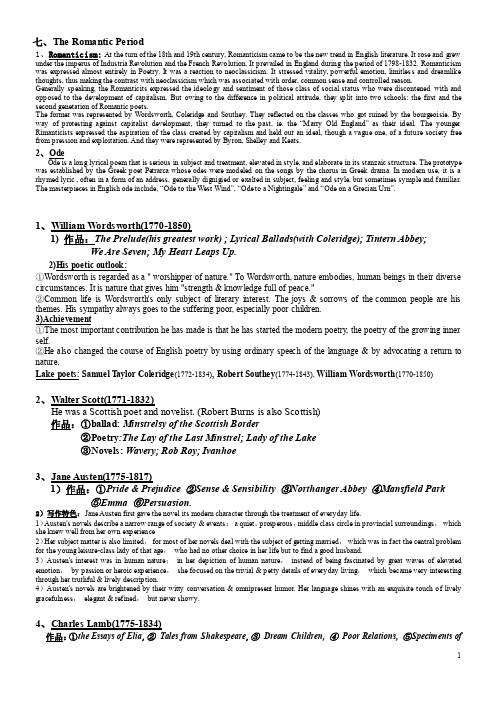
七、The Romantic Period1、Romanticism: At the turn of the 18th and 19th century, Romanticism came to be the new trend in English literature. It rose and grew under the imperus of Industria Revolution and the French Revolution. It prevailed in England during the period of 1798-1832. Romanticism was expressed almost entirely in Poetry. It was a reaction to neoclassicism. It stressed vitality, powerful emotion, limitles s and dreamlike thoughts, thus making the contrast with neoclassicism which was associated with order, common sense and controlled reason.Generally speaking, the Romanticits expressed the ideology and sentiment of those class of social status who were discontened with and opposed to the development of capitalism. But owing to the difference in political attitude, they split into two schools: the first and the second genetation of Romantic poets.The former was represented by Wordsworth, Coleridge and Southey. They reflected on the classes who got ruined by the bourgeoisie. By way of protesting agai nst capitalist development, they turned to the past, ie. the “Marry Old England” as their ideal. The younger Rimanticists expressed the aspiration of the class created by capitalism and held out an ideal, though a vague one, of a future society free from pression and exploitation. And they were represented by Byron, Shelley and Keats.2、OdeOde is a long lyrical poem that is serious in subject and treatment, elevated in style, and elaborate in its stanzaic structure. The prototype was established by the Greek poet Petrarca whose odes were modeled on the songs by the chorus in Greek drama. In modern use, it is a rhymed lyric , often in a form of an address, generally dignigied or exalted in subject, feeling and style, but sometimes symple and familiar. The masterpieces in English ode include, “Ode to the West Wind”, “Ode to a Nightingale” and “Ode on a Grecian Urn”.1William W ordsworth(1770-1850)作品:The Prelude(his greatest work) ; Lyrical Ballads(with Coleridge); Tintern Abbey;We Are Seven; My Heart Leaps Up.2)His poetic outlook:①Wordsworth is regarded as a " worshipper of nature." To Wordsworth, nature embodies, human beings in their diverse circumstances. It is nature that gives him "strength & knowledge full of peace."②Common life is Wordsworth's only subject of literary interest. The joys & sorrows of the common people are his themes. His sympathy always goes to the suffering poor, especially poor children.3)Achievement①The most important contribution he has made is that he has started the modern poetry, the poetry of the growing inner self.②He also changed the course of English poetry by using ordinary speech of the language & by advocating a return to nature.Lake poets: Samuel T aylor Coleridge(1772-1834), Robert Southey(1774-1843), William Wordsworth(1770-1850)2W alter Scott(1771-1832)作品:①ballad: Minstrelsy of the Scottish Border②Poetry:The Lay of the Last Minstrel; Lady of the Lake③Novels: Wavery; Rob Roy; Ivanhoe3Jane Austen(1775-1817))作品:①②Sense & Sensibility ③Northanger Abbey ④Mansfield Park⑤Emma ⑥Persuasion.2)写作特色:Jane Austen first gave the novel its modern character through the treatment of everyday life.1)Austen's novels describe a narrow range of society & events:a quiet,prosperous,middle class circle in provincial surroundings,which she knew well from her own experience2)Her subject matter is also limited,for most of her novels deal with the subject of getting married,which was in fact the central problem for the young leisure-class lady of that age,who had no other choice in her life but to find a good husband.3)Austen's interest was in human nature;in her depiction of human nature,instead of being fascinated by great waves of elevated emotion,by passion or heroic experience,she focused on the trivial & petty details of everyday living,which became very interesting through her truthful & lively description.4)Austen's novels are brightened by their witty conversation & omnipresent humor. Her language shines with an exquisite touch of lively gracefulness,elegant & refined,but never showy.4Charles Lamb(1775-1834)作品:①the Essays of Elia,②Tales from Shakespeare,③Dream Children, ④Poor Relations,⑤Speciments ofEnglish Dramatic Poets Contemporary with Shakespeare.5George Gordon, Lord Byron(1788-1824)1) 作品Children Harold’s Pilgrimage; Oriental Tales; Manfred; Cain; Don Juan②Short lyricsWhen We Two Parted; She Walks in Beauty2) Artistic AchievementByronic HeroAs a leading Romanticist, Byron's chief contribution is his creation of the " Byronic hero," a proud & mysterious rebel figure of noble origin. With immense superiority in his passions & powers, the Byronic hero would carry on his shoulders the burden of righting all the wrongs in an evil society, & would fight single-handedly against any kind of tyrannical rules either in government, in religion or in moral principles with unconquerable wills & inexhaustible energies. The conflict is usually one of rebellious individuals against outworn social systems & convention. Such a hero appears first in Childe Harold's Pilgrimage, & then further developed in later works such as Oriented Tales, Manfred, & Don Juan in different guises. The figure is, to some extent, modeled on the life & personality of Byron himself, & makes Byron famous both at home and abroad.6Percy Bysshe Shelley(1792-1822)作品:Prose:Defence of PoetryPoem: A Song: “Men of England”;"To a Skylark" ;"Ode to the West Wind";Queen Mab; The Revolt of Islam; The Maspue of Anarchy.7John Keats(1795-1821)”墓志铭:Here lies one whose name was writ in water.1)作品:Endymion; Ode to a Nightingale; Ode on an Grecian Urn; Lamia, Isabella, The Eve of St.Agnes,& Other Poems.2)济慈四大颂歌:①Ode to a Nightingale;②Ode on a Grecian Urn ③To Autumn;④To Melncholy。
英国浪漫主义文学特点

英国浪漫主义文学特点英国浪漫主义文学是一种文学运动,兴起于18世纪末19世纪初,主要流行于英国,对欧洲文学也有一定的影响。
它是人们在繁荣的工业革命和社会政治变革的同时,对传统宗教信仰和世俗主义的脱离,在情感、想象和自然中寻求自由、真实、内心存在和精神平衡的一种文学创作体系。
一、强调个人感受和情感表达在英国浪漫主义文学中,强调个人的感受和情感表达,尤其是对爱、痛苦和孤独等情感的深刻认识和表达。
例如,济慈在《患难中的灵感》中写道:“给我一个悔恨的心,让我为一切泣泪,我就能捉住——到如此微妙的角度——心灵最好的祝福。
”二、强调想象和幻想英国浪漫主义文学强调想象和幻想,批判现实主义对想象的忽视和扼杀。
浪漫主义文学作家通过对自然、神秘、超验、异世界等体验的描写和幻想,营造出一种超越现实的世界,使读者得到情感上的满足。
例如,雪莱在《弥赛亚之大编年史》中写到:“它的神秘是令人发疯的;我可以在混乱之中发现所有的美和良善。
”三、推崇自然和原始生活英国浪漫主义文学崇拜自然和原始生活,认为自然是人文价值的源泉,是对人类经验的显现。
浪漫主义文学作家会用丰富的词语和形象的描写来表达对风景和自然景观的热爱。
例如,金斯莱为了忘却真正的恐惧,来到了莎士比亚的故乡,在那里:“留下了我的负担,在河边沐浴,把头淋湿。
”四、反对现代文明化的机械化和工业化由于19世纪初英国的繁荣和工业革命,浪漫主义文学作家对现代文明化的机械化和工业化持有负面态度。
他们认为机器生产和资本主义的运作是对人性的破坏,导致人们丧失生命的真正意义。
例如,在考德威尔的《固态善良项目》中,作家批判了社会科技化的动向,呼吁保护自然环境和传统人文价值。
英国浪漫主义文学的特点

英国浪漫主义文学的特点
英国浪漫主义文学的特点
英国浪漫主义文学,又称文艺复兴浪漫主义,是18世纪末19世纪初英国文学的重要流派。
与当时英国的社会政治变化密切相关的,是新意识形态的产物,属于文学史上新近发展起来的一个流派,影响了西欧文学界的发展。
英国浪漫主义文学以理性与启蒙主义思想为基础,通过超现实的思维方式,立足于“自我”,强调“个人自由”,以“想象”“梦想”
和“希望”为基础,把握着一种“超越理性的精神”来创作,以“浪漫”和“神秘”的色彩为文学表现手法来表达自己的观念,表现出一种渴望超脱现实、追求自由的激情。
英国浪漫主义文学的风格特点有以下几点:
一是以个人主义为主。
英国浪漫主义文学以崇尚个性、强调主体自我为主题,强调曲折的个人历险重组自我,在“心灵探索”中探寻自我价值,追求自我内在实现的理想。
二是以超常叙事为特色。
英国浪漫主义文学的叙事手法,常用神话、幻想、童话等超常叙事手法,充满浪漫气息;把此特点发挥到极致,使小说形成一种自然充满艺术效果的视觉体验。
三是以艺术化语言为特征。
英国浪漫主义文学重视语言的艺术性,善于将句式、用词灵活多变,有意提高语言的艺术性,充满诗意情趣。
四是以异想天开为抒发自由感恩观念。
英国浪漫主义文学把信仰、理想、梦想以及自由和希望都融入其中,表达出了一种异想天开的美
好憧憬,给读者带来了一种自由神态,使他们在浪漫的气氛中感受到自由的惊喜。
英国文学18-19世纪浪漫主义

Part Five: Romanticism in Englandthe Age of PoetryTeaching Arrangement:I. Historical BackgroundII. RomanticismIII. A. poets1. Escapist romanticists / Lake Poets(湖畔派诗人) (William Wordsworth, Samuel Taylor Coleridge, Robert Southey)2. active romanticists /demonic group/Satanic school (撒旦派) (George Gordon Byron, Percy Bysshe Shelley, John Keats)B. essayists (Charles Lamb, William Hazlitt, Thomas De Quincey)C. novelist (Walter Scott)I. Historical Background(1) Industrial Revolution —transformed Britain from agricultural to industrial country, responsible for the change in the pattern of social life and the worsening of social contradictions;?(2) American revolution in 1775— the Declaration of Independence, written by Thomas Jefferson in 1776, with its emphasis on individual rights;(3) The French revolution in 1789 —introduced the democratic ideals: liberty, equality and fraternity for everybody;(4)the abolition of slavery in the British colonies;(5) the introduction of system of national education;(6)the Factory Acts《工厂法案》by which the employment of children under nine was forbidden by the law.(7) Lyrical Ballads, 《抒情歌谣集》a collection of poem by William Wordsworth and Samuel Taylor Coleridge, published in 1798, which marked the start of Romanticism as a literary trend. II. English Romanticism1. definition—English Romanticism is generally said to have began in 1798 with the publication of Wordsworth & Coleridge‘s Lyrical Ballads and to have ended in 1832 with Sir Walter Scott’s death and the passage of the first Reform Bill《改革法案》in the Parliament.English Romanticism is a revolt of the English imagination against the neoclassical reason. The French Revolution of 1789-1794 and the English Industrial Revolution exert great influence on English Romanticism.Romanticists show in their works their profound dissatisfaction with the social reality and their deep hatred for any political tyranny, economic exploitation and any form of oppression, feudal or bourgeois. In the realm of literature, they revolt against reason, rules, regulation, objectivity, common senses, etc. and emphasize the value of feelings, intuition, freedom, nature, subjectivism, individuality, originality, imagination, etc.2. The features of the Romantic writings:1)? Dissatisfaction with the bourgeois society.2) Their writings filled with strong-willed heroes or even titanic images, formidable events and tragic situations, powerful conflicting passions and exotic pictures.3) pay attention to spiritual and emotional life of man. Most works are supernatural and full ofimagination.4) interest in the past, the unusual, the unfamiliar, the bizarre5) strong desire to escape from the reality.6) concerned much about the influence of nature.7) Their writings free from any rules, they fight against the tenure of new classicism: order, harmony, balance, reason. They ask for the freedom of expression.8) A feeling of loneliness & a note of melancholy8) The glorification of the commonplace--- the aim of good poetry is “to choose incidents and situations from comm on life” and to use a “selection of language really spoken by men”, and to awaken in the reader “freshness of sensation” in the presentation of “familiar objects”.9) characterized by 5 “I”s: Imagination, Intuition, Idealism, Inspiration, Individuality.3. Two schools of RomanticismA. escapist romanticists, “the Lake Poets”湖畔派, represented by William Wordsworth华兹华斯, Samuel Taylor Coleridge柯勒律治and Robert Southey骚塞.B. active romanticists, “the Satanic school”撒旦派, with Byron拜伦, Shelly雪莱and Keats 济慈as representatives湖畔派Lake Poets18~19世纪的英国浪漫主义诗歌流派。
《雪莱对浪漫主义文学运动的贡献和影响》

雪莱对浪漫主义文学运动的贡献和影响1. 引言雪莱(Percy Bysshe Shelley)是18世纪末到19世纪初英国文学史上一位杰出的浪漫主义诗人。
他在诗歌创作中表达了自由、个人感受和对社会变革的渴望,对浪漫主义文学运动做出了重要的贡献,并且深刻地影响了后来的诗人和文化。
2. 雪莱的个人生平与理念雪莱是一个极其富有才华、充满激情和反叛精神的诗人。
他早期就展现出了对政治、社会和宗教问题的关注,这些关注在他后来的作品中得到了淋漓尽致的体现。
雪莱主张个性解放、自由思考和充分表达情感,这些理念成为他作品中不可或缺的一部分。
3. 雪莱作品中的浪漫主义元素3.1 自然:雪莱深情地描绘了自然界,将其视为力量源泉和灵感之地。
他运用丰富的比喻和象征手法,将自然与个人内心世界相融合,传达出情感的深度和力量。
3.2 对抗传统:雪莱反对社会的权威和传统的束缚,他认为自由才是个体真正需要追求的东西。
他通过作品表达了对政府、宗教和教育制度不满的态度,呼吁人们要勇于质疑并追求真理。
3.3 诗歌即为灵魂:雪莱认为诗歌是表现灵魂内涵的最佳媒介。
他用诗歌来探索思想、情感和意义,并试图唤起读者内心深处沉睡已久的自我。
4. 雪莱对后世诗人的影响4.1 爱瑟琳·艾文斯顿:爱瑟琳在她的诗歌中继承了雪莱浪漫主义诗风,关注社会问题,并以激情和情感直触读者内心。
4.2 罗伯特·布朗宁:布朗宁受到了雪莱爱情诗集《霍利男爵与比顿世女爵》的影响,他以情感的力量和对社会公义的追求为主题进行创作。
4.3 托马斯·哈代:哈代在他的小说中探索了个人主义、浪漫主义以及社会不公等问题,这些都可以追溯到雪莱的影响。
5. 结论雪莱是英国浪漫主义文学运动中一位重要的诗人,他通过作品表达了个人解放和对社会变革的渴望。
他对自然、对传统权威的抗拒以及将诗歌视为灵魂表现之媒介等思想成为后世诗人们所借鉴和发展的重要元素。
雪莱无疑在浪漫主义文学运动中留下了深远而持久的影响。
外国文学名词解释
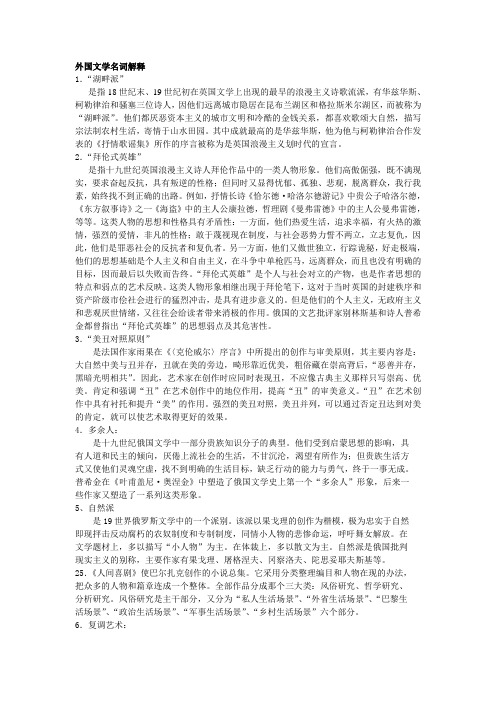
外国文学名词解释1.“湖畔派”是指18世纪末、19世纪初在英国文学上出现的最早的浪漫主义诗歌流派,有华兹华斯、柯勒律治和骚塞三位诗人,因他们远离城市隐居在昆布兰湖区和格拉斯米尔湖区,而被称为“湖畔派”。
他们都厌恶资本主义的城市文明和冷酷的金钱关系,都喜欢歌颂大自然,描写宗法制农村生活,寄情于山水田园。
其中成就最高的是华兹华斯,他为他与柯勒律治合作发表的《抒情歌谣集》所作的序言被称为是英国浪漫主义划时代的宣言。
2.“拜伦式英雄”是指十九世纪英国浪漫主义诗人拜伦作品中的一类人物形象。
他们高傲倔强,既不满现实,要求奋起反抗,具有叛逆的性格;但同时又显得忧郁、孤独、悲观,脱离群众,我行我素,始终找不到正确的出路。
例如,抒情长诗《恰尔德·哈洛尔德游记》中贵公子哈洛尔德,《东方叙事诗》之一《海盗》中的主人公康拉德,哲理剧《曼弗雷德》中的主人公曼弗雷德,等等。
这类人物的思想和性格具有矛盾性:一方面,他们热爱生活,追求幸福,有火热的激情,强烈的爱情,非凡的性格;敢于蔑视现在制度,与社会恶势力誓不两立,立志复仇,因此,他们是罪恶社会的反抗者和复仇者。
另一方面,他们又傲世独立,行踪诡秘,好走极端,他们的思想基础是个人主义和自由主义,在斗争中单枪匹马,远离群众,而且也没有明确的目标,因而最后以失败而告终。
“拜伦式英雄”是个人与社会对立的产物,也是作者思想的特点和弱点的艺术反映。
这类人物形象相继出现于拜伦笔下,这对于当时英国的封建秩序和资产阶级市侩社会进行的猛烈冲击,是具有进步意义的。
但是他们的个人主义,无政府主义和悲观厌世情绪,又往往会给读者带来消极的作用。
俄国的文艺批评家别林斯基和诗人普希金都曾指出“拜伦式英雄”的思想弱点及其危害性。
3.“美丑对照原则”是法国作家雨果在《〈克伦威尔〉序言》中所提出的创作与审美原则,其主要内容是:大自然中美与丑并存,丑就在美的旁边,畸形靠近优美,粗俗藏在崇高背后,“恶善并存,黑暗光明相共”。
- 1、下载文档前请自行甄别文档内容的完整性,平台不提供额外的编辑、内容补充、找答案等附加服务。
- 2、"仅部分预览"的文档,不可在线预览部分如存在完整性等问题,可反馈申请退款(可完整预览的文档不适用该条件!)。
- 3、如文档侵犯您的权益,请联系客服反馈,我们会尽快为您处理(人工客服工作时间:9:00-18:30)。
Part Five: Romanticism in Englandthe Age of PoetryTeaching Arrangement:I. Historical BackgroundII. RomanticismIII. A. poets1. Escapist romanticists / Lake Poets(湖畔派诗人) (William Wordsworth, Samuel Taylor Coleridge, Robert Southey)2. active romanticists /demonic group/Satanic school (撒旦派) (George Gordon Byron, Percy Bysshe Shelley, John Keats)B. essayists (Charles Lamb, William Hazlitt, Thomas De Quincey)C. novelist (Walter Scott)I. Historical Background(1) Industrial Revolution —transformed Britain from agricultural to industrial country, responsible for the change in the pattern of social life and the worsening of social contradictions;?(2) American revolution in 1775— the Declaration of Independence, written by Thomas Jefferson in 1776, with its emphasis on individual rights;(3) The French revolution in 1789 —introduced the democratic ideals: liberty, equality and fraternity for everybody;(4)the abolition of slavery in the British colonies;(5) the introduction of system of national education;(6)the Factory Acts《工厂法案》by which the employment of children under nine was forbidden by the law.(7) Lyrical Ballads, 《抒情歌谣集》a collection of poem by William Wordsworth and Samuel Taylor Coleridge, published in 1798, which marked the start of Romanticism as a literary trend. II. English Romanticism1. definition—English Romanticism is generally said to have began in 1798 with the publication of Wordsworth & Coleridge‘s Lyrical Ballads and to have ended in 1832 with Sir Walter Scott’s death and the passage of the first Reform Bill《改革法案》in the Parliament.English Romanticism is a revolt of the English imagination against the neoclassical reason. The French Revolution of 1789-1794 and the English Industrial Revolution exert great influence on English Romanticism.Romanticists show in their works their profound dissatisfaction with the social reality and their deep hatred for any political tyranny, economic exploitation and any form of oppression, feudal or bourgeois. In the realm of literature, they revolt against reason, rules, regulation, objectivity, common senses, etc. and emphasize the value of feelings, intuition, freedom, nature, subjectivism, individuality, originality, imagination, etc.2. The features of the Romantic writings:1)? Dissatisfaction with the bourgeois society.2) Their writings filled with strong-willed heroes or even titanic images, formidable events and tragic situations, powerful conflicting passions and exotic pictures.3) pay attention to spiritual and emotional life of man. Most works are supernatural and full ofimagination.4) interest in the past, the unusual, the unfamiliar, the bizarre5) strong desire to escape from the reality.6) concerned much about the influence of nature.7) Their writings free from any rules, they fight against the tenure of new classicism: order, harmony, balance, reason. They ask for the freedom of expression.8) A feeling of loneliness & a note of melancholy8) The glorification of the commonplace--- the aim of good poetry is “to choose incidents and situations from comm on life” and to use a “selection of language really spoken by men”, and to awaken in the reader “freshness of sensation” in the presentation of “familiar objects”.9) characterized by 5 “I”s: Imagination, Intuition, Idealism, Inspiration, Individuality.3. Two schools of RomanticismA. escapist romanticists, “the Lake Poets”湖畔派, represented by William Wordsworth华兹华斯, Samuel Taylor Coleridge柯勒律治and Robert Southey骚塞.B. active romanticists, “the Satanic school”撒旦派, with Byron拜伦, Shelly雪莱and Keats 济慈as representatives湖畔派Lake Poets18~19世纪的英国浪漫主义诗歌流派。
主要成员有华兹华斯、柯尔律治和骚塞。
由于他们三人曾一同隐居于英国西北部的昆布兰湖区,先后在格拉斯米尔和文德美尔两个湖畔居住,以诗赞美湖光山色,所以有“湖畔派诗人”之称。
在诗歌题材上,他们主张写下层人民的日常生活,强调诗人的内心探索和感情的自然流露;在诗体方面,主张发展民间诗歌的艺术传统,采用民间口语,发挥诗人的想象力。
他们的理论和实践结束了英国古典主义诗学的统治,对英国诗歌的改革和发展起了很大作用。
但是他们否定诗歌的社会作用,美化中世纪的田园生活,提倡唯心主义、唯灵主义、神秘主义;把“听天由命”看成是人的“天性的永恒部分”;拜伦和雪莱对此进行过激烈的批评。
湖畔派诗人起初都同情法国革命,随着革命的深入,由害怕革命而退却,进而逃避现实,迷恋过去,美化中世纪的宗法制,幻想从古老的封建社会中去寻找精神的安慰与寄托。
当湖畔派诗人的消极倾向日益明显的时候,青年诗人拜伦、雪莱开始登上文坛,向湖畔派诗人展开论争。
拜伦在一八O九年完成的讽刺长诗《英格兰诗人和苏格兰评论家》中,不仅回答了消极浪漫主义者操纵的刊物《爱丁堡评论》对拜伦诗作的攻击,而且还严厉地谴责了湖畔派诗人的消极倾向。
由于他们敢于向湖畔派诗人作斗争,因而被英国绅土们斥之为撒旦(恶魔),所以文学史上称拜伦、雪莱和济慈为“撒旦派”。
一般说,湖畔派诗人代表消极浪漫主义倾向,撒旦派代表积极浪漫主义精神。
虽然湖畔派诗人在与古典主义的斗争中有过贡献,在诗歌的艺术上有较深的造诣,但其历史地位远不及撒旦派重要。
III. poets—Lake Poets1. William Wordsworth威廉·华兹华斯(重点)1.1 lifeBorn in 1770 i n a lawyer‟s familyOrphaned when he was 14Went to school in Hawkshead, developed a deep love for nature1787-1791 Studied at Cambridge--political enthusiasm roused1790-1792 visited France twiceIn 1797, moved to Somerset with his sister Dorothy and made friends with Coleridge, all devoting their time writing poetryPublished Lyrical Ballads together with Coleridge.Two periods of his literary careerA revolutionist with liberal politics idea and ambiguous religionA conservative, coming to believe that man‟s wild spirit is needed taming by the church1.2 major works:1) Lyrical Ballads 《抒情歌谣集》followed by “The Preface to the Lyrical Ballads”—served as the manifesto of the English Romantic Movement in poetry.2) famous short poems:About nature: “I wondered Lonely as a Cloud”“独自漫游似浮云”,or “The Daffodils”“咏水仙”“Intimation of Immortality”“不朽颂”“Lines Composed a Few Miles Above Tintern Abbey”“丁登寺”; “To the Cuckoo”“致布谷鸟”; “My Heart Leaps up When I Behold”“我心雀跃”; “To a Butterfly”“致蝴蝶”“An Evening Walk”“黄昏漫步”About human life:--sympathy for the poorLucy Poems 《露西组诗》“The Solitary Reaper”“孤独的收割者”“The Old Cumberland Beggar”“康伯兰的老乞丐”“Michael”“迈克尔”“We are Seven”“我们七个”3) “The Prelude”“序曲”--Wordsworth’s autobiographical poem in 14 books published after his death, a spiritual record of his mind, showing his own thought and sentiment.1.3 Comment on WordsworthA. The poet of natureNature---medium---revelation (启示)Nature--- entity--- communicating with God, learning more about God, and enjoying the holy and awesome feelingsNature--- purest, most uncorrupted form, a manifestation of God‟s creation powerB. Wordsworth‟s definition to poetryGood poetry must speak “the real language of man” and write about the life of common people i n an imaginative way.Good poetry is “the spontaneous overflow of powerful feelings.”诗是强烈情感的自然流露。
